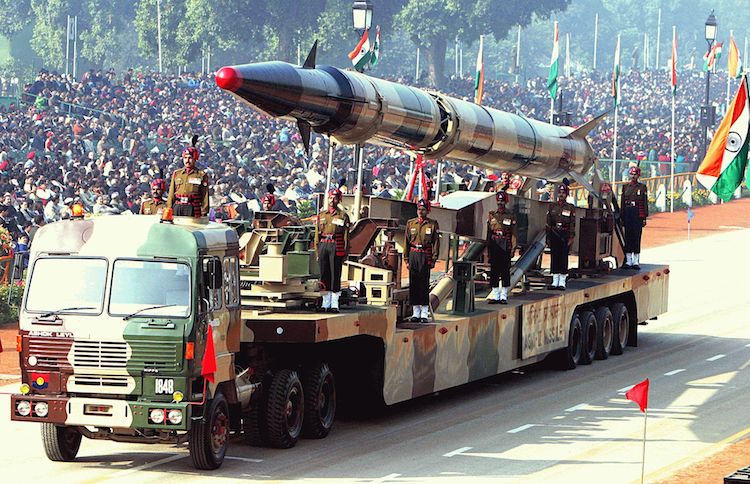By Amandeep Singh Gill
Ambassador Amandeep Singh Gill is Permanent Representative of India to the Conference on Disarmament in Geneva. Following are extensive excerpts from his remarks at the Thematic Debate on Nuclear Weapons in the First Committee, 72nd Session of the UN General Assembly on 12 October 2017. – The Editor.
UNITED NATIONS (IDN) –India remains committed to universal, non-discriminatory and verifiable nuclear disarmament and to multilateralism in pursuit of that goal. Our position has been firm and consistent over the years.
We support the proposal for the negotiation of a Comprehensive Nuclear Weapons Convention in the Conference on Disarmament (CD). Without prejudice to the priority we attach to nuclear disarmament, we also support the immediate commencement of negotiations in the CD of a Fissile Material Cut-off Treaty on the basis of CD/1299 and the mandate contained therein.
As a responsible nuclear power, India has a policy of credible minimum deterrence based on a No First Use posture and non-use of nuclear weapons against non-nuclear weapon states. We remain committed to maintaining a unilateral voluntary moratorium on nuclear explosive testing.
Since there was a reference to India and the NPT [Treaty on the Non-Proliferation of Nuclear Weapons] . . . let me say that India’s position on the NPT is well-known and should require no reiteration. The question of India joining the NPT as NNWS [non-nuclear-weapon state] does not arise.
At the same time, we support upholding and strengthening global non-proliferation objectives, in particular the full and effective implementation by States of their obligations arising from the relevant agreements and treaties, including the NPT.
Despite being a non-party, India abides by the principles and objectives of the NPT, including its nuclear disarmament aspirations. India is committed to making its contribution to strengthening non-proliferation. We have updated our agenda; and hope our friends will renew theirs and focus on the real implementation deficits on non-proliferation and disarmament.
India did not participate in the negotiations leading to the adoption of the Treaty on the Prohibition of Nuclear Weapons. India, therefore, cannot be a party to the treaty, and shall not be bound by any of the obligations that may arise from it. As in the past, India remains ready to work with the signatories to the treaty for progress in multilateral forums on the shared goal of the global elimination of nuclear weapons.
India has made clear its position on the missile tests and nuclear test conducted by DPRK through its statements of July 7 and September 3 this year. It is a matter of deep concern that DPRK [Democratic People’s Republic of Korea] has acted in violation of its international commitments and against the objective of the denuclearisation of the Korean peninsula, which has been endorsed by DPRK itself. We call upon DPRK to refrain from such actions which adversely impact peace and stability in the region and beyond.
India also remains concerned about proliferation of nuclear and missile technologies, which has adversely impacted India’s national security. The international community should take a united stand against those who indulge in or benefit from clandestine proliferation linkages.
On behalf of the sponsors, India would like to present two draft resolutions under this cluster. The first, on a ‘Convention on the Prohibition of the Use of Nuclear Weapons‘, was first introduced in 1982 and is one of the long-standing resolutions in the First Committee. It reflects our belief that a legally-binding instrument prohibiting the use or threat of use of nuclear weapons negotiated in the Conference of Disarmament with the participation of all nuclear weapons possessing states will contribute to the process of the step-by-step de-legitimization of nuclear weapons.
As such, it is firmly anchored in the humanitarian tradition of nuclear disarmament. We urge those states which continue to vote against this resolution to reconsider their position to bring it in line with their professed support for the prohibition of nuclear weapons.
The second draft resolution on ‘Reducing Nuclear Danger’, highlights the need for a review of nuclear doctrines and the need for steps to reduce the risk of unintentional or accidental use of nuclear weapons, including through de-alerting and de-targeting of nuclear weapons. We welcome the greater resonance in the international community on the objectives of this resolution of avoiding unintentional or accidental use of nuclear weapons. [IDN-InDepthNews – 19 October 2017]
Photo: An Indian Agni-II intermediate range ballistic missile on a road-mobile launcher, displayed at the Republic Day Parade on New Delhi’s Rajpath, January 26, 2004. Credit: Wikimedia Commons.
IDN is flagship agency of the International Press Syndicate

